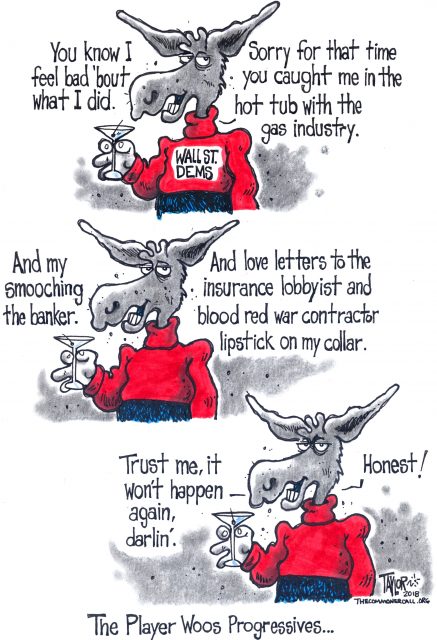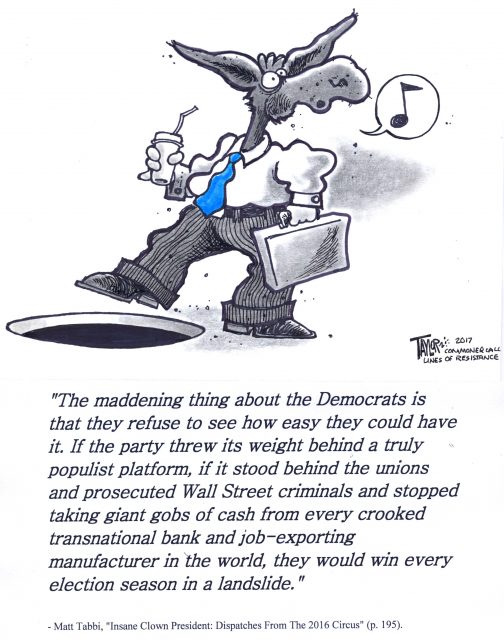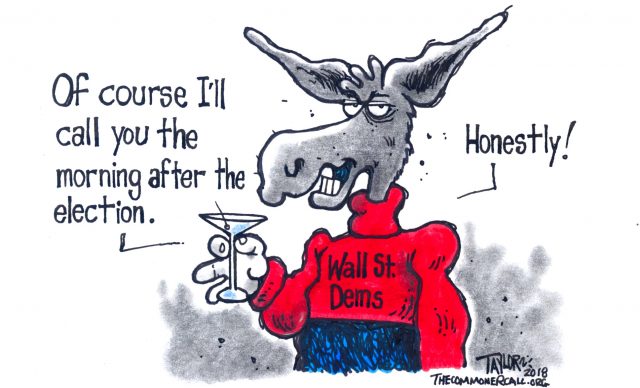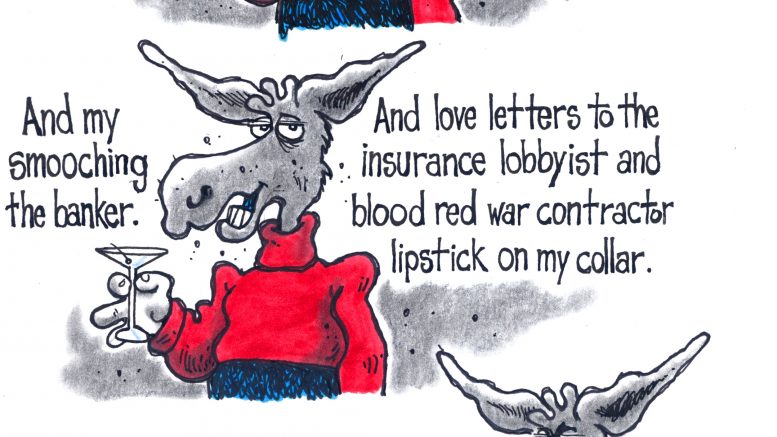
By Mark L. Taylor
The Commoner Call (4/8/18)
In a recent Facebook squabble I was accused of aiding and abetting the republicans by saying it’s right not to support West Virginia Sen. Joe “Big Coal” Manchin’s re-election because of his cuddling up to republicans to help send Brett “Brewski” Kavanaough off to the Supreme Court. I posted and supported a couple articles referencing the need to stop supporting corporate dems who continually represent the greedy whims of the 1% and corporations over the needs of the voters who put them in office. One article referenced two liberal groups denying any of their funding to Manchin. A move I strongly supported.
Until recently, I was a fairly long-time member of my local county democratic party and paid my yearly dues. I volunteered to the extent I could, regularly went to monthly and some special committee meetings, drove to occasional out-of-town meetings, gave money, donated art when asked and responded to many party calls for actions. This year, however, when the renewal notice came I tossed it in the recycle box; it just didn’t seem worthwhile anymore. For some time it had felt like a waste of time, energy and trust.
At meetings any questioning of the party was mostly met with stern glares and lectures about “pulling together” — no matter that a candidate was non-responsive or outright duplicitous or the Democratic Party of Wisconsin (DPW) actions in local races counter-productive. Democrats like to talk about a big tent, but everyone has an assigned seat.
The longer I hung around the party the more I saw party members didn’t have any meaningful say, sway or influence; it always came down to a handful of highly paid Milwaukee or Madison campaign consultants and advertising operations — some also serving republican opponents — who piss away scarce campaign funds for totally worthless out-sized postage cards that fill the waste basket every election season at the Genoa post office. And in the meantime they lose a lot.
I do vote for some dem candidates and — as I did during the recent SCOTUS hearings — donate to progressive candidates and groups.
With the midterms rolling toward us I am again told this is not the time (there is never a good time, it seems) for airing dirty party underwear; that we need to close ranks to defend against the GOP’s fascist front. The time for intraparty opposition and questioning, I am sternly told, is during the primary process and once that is past it is time to zip the lip and fall in line.
The primary delusion
The “pulling together” argument makes some initial sense but for one important glitch: we don’t have a primary system that works. I have been through enough poisoned primary efforts where I have seen good and sincere candidates get shut out and shut down by the DPW to know that the process is as ill as it is disingenuous. The state and national parties are set up first and foremost to protect incumbents … and funnel money to the consultants who then kick contributions back to the parties.
The result has been quislings like “Big Coal” Manchin and Rep. Ron “Wall Street” Kind. We all saw the duplicity with which the state and national parties — yes, even here in Wisconsin — dealt with Sen. Bernie Sanders and his supporters, some of which is richly detailed in Michael Moore’s latest documentary Fahrenheit 11/9.
But it’s bigger that.
Republicans control the White House, both houses of congress and now with Kavanough, the Supreme Court and a growing chunk of the lower federal courts. The GOP has corralled 33 of the governorships along with 66 of the 99 state legislatures. One of the legacies of the democrat’s sainted Barack Obama — who refused to prosecute the Wall Street grifters who bankrupted millions of the party’s working and middle class supporters and left the party coffers near empty — some 900 state legislative offices across the nation got pocketed by far right republicans.
In 2016, Hillary Clinton got 65 million votes. Trump got 63 million. And the number of those who chose not to vote? 100 million.
Call me a curmudgeon, but if this “fall in line” rap is the answer it isn’t working!
So when we don’t have an honest primary process what is one to do? Zip the lip and fall in line is not the answer.
But I am told, this is an “important election.” I get that. I’m actually enough of an idealist to believe that every election is important. Always have. So important in fact that blinkered party partisanship is something that always needs to be challenged in every election season and every off-year. Donald Trump is our czar because we haven’t put quisling dems on the spot.
The fallacy of the devil’s bargain
But, I am told, a puddle of a neoliberal corporate dem is better than a republican. Um, the results argue against such a devil’s bargain. Again, look at the results outlined above. We see these characters occasionally vote the right way on smaller issues, but when it comes to war, Wall Street and corporate empowerment they reliably line up with the GOP. But if dems refused to slavishly support the likes of Manchin and Kind something interesting might happen if a few corporate dems did wind up losing.
Imagine the terror that would seep into the tiny money-grubbing hearts of the corporate dems, even if they did win a fixed primary. In the dark of the night they will lie awake wondering:
“Oh my God, the scam is no longer working! I could be next.”
Can a progressive win in a place like West Virginia — the state Manchin has long betrayed? Hell, yeah! One just did. Bigly! Check out the story of former Trump voter progressive congressional candidate Richard Ojeda who just won his primary by 17 points in Manchin’s West Virginia, here.
As Moore has pointed out, progressive views are held by the majority of Americans. Those Americans — perhaps beginning with the 100 million politically homeless noted above — need a party that cares about them.
Of course there’s the whole treasonous neoliberal con game of the Clinton dem party big wigs to consider in the mix. The article below gives some perspective on that.
But here’s the bottom line:
As anyone who has been in an abusive relationship knows, there comes a time when a line of betrayal, broken promises and abuse has been crossed and a person needs to stand up. Is there ever a time when that is convenient? No. Is there pain and potential loss in that process? Of course, but there is also the chance for freedom and empowerment. And that, my fellow progressives, is as true of the political as it is of the personal.
Time is short.

*****
Electing Democrats In November Without Confronting Neoliberalism Will Not Be Enough. It’s Never Been Enough

By Eric Stoner
Truthout (9/29/18)
In recent decades, there has been an explosion of social movements and protest around an ever-growing range of issues. To the casual observer, tree-sits by Earth First! activists to protect old-growth forests, courageous farmerworkers organizing to end modern-day slavery in Florida’s tomato fields, and young military veterans reenacting war scenarios in uniform on the streets of New York have little to do with each other.
However, in his new book The Defiant: Protest Movements in Post-Liberal America, Dawson Barrett makes a compelling argument that these seemingly disparate movements — for environmental and economic justice, to end US militarism and wars abroad, and even the rise of youth countercultures, like those that birthed punk rock and hip hop — are in fact far more connected than is first apparent. They are all responding to the different manifestations of the neoliberal economic model, which prioritizes corporate profits over people and the environment.
We are at a crossroads, and there are paths that lead to a more just and human world, but also paths that lead to a Mad Max-style hellscape.
Despite their valiant efforts, Barrett contends that organizers today have yet to secure the “wide-reaching, concrete accomplishments of earlier movements.” In this interview, he expands on why this is the case, what particular campaigns have done to win meaningful victories in recent years, and where he sees glimmers of hope today.
Eric Stoner: How do you define the post-liberal era, and why do you think social movement victories have been so “rare and dishearteningly limited” in recent decades?
Dawson Barrett: The shift was actually messy and gradual, but I mark the post-liberal era as beginning with the 1980 election of Ronald Reagan. From roughly the 1930s into the 1970s, mainstream politicians of both parties had more or less accepted liberal economic planks (taxes on the rich and powerful, basic guarantees of workers’ rights, environmental protections, etc.), thus making it the liberal era.
Since Reagan, though, both parties have pursued what is called neoliberalism, a confusing word that basically just means tax cuts for the rich, service cuts for the working and middle classes, de-regulation of industry and public money for corporations through privatization. Some people have suggested more useful terms for neoliberalism, including “casino capitalism” (the house always wins) and “Jurassic Parkcapitalism” (maybe we get eaten in the end). Those both sound about right to me. Bluntly speaking, neoliberalism funnels trillions of dollars from the public into the pockets of the extremely wealthy — that’s the goal, in fact, and it has worked well. …
*****

Journalist Chris Hedges Lays Out The Source & Scope Of The Tragedy The Nation Is Now Struggling With … And What Democrats Are Missing.
“We must look to what is happening to the least among us to understand where the corporate state intends to go.” — Chris Hedges
Radio open Source (10/4/18)
TDS is the acronym. Trump Derangement Syndrome is the full name: a distaste for Donald Trump so severe that sufferers abandon all logic and reason, all sense of proportion. But what if the breakdown they dread is in truth out of the standard headline proportions, beyond the banality or the evil of one man in one office. Chris Hedges, a certified doom-monger, sees Donald Trump as one of many symptoms, like climate change, of a man-made virus of civilizational proportions, a sublime madness, in theological terms, a late-imperial drift into delusion, and self-destruction. He sees narcissism and nihilism, a spiritual crisis behind a political mask.
Chris Hedges – the war reporter and doom-sayer – brings us a solemn sermon of warning about the trouble we’re all in. His new book is titled America: The Farewell Tour. Donald Trump has a minor part in it. Chris Hedges got hooked on war assignments with The New York Times, hardened on battlefields in Latin America, Africa, the Balkans and nthe Middle East. He got some of his soul back studying theology and classical literature for his best-seller, War is a Force that Gives Us Meaning. The rush of battle, he has written, going back to ancient times in Homer and the Bible, is an often lethal addiction – it’s a drug he himself ingested for years. But it’s just one of the addictions Chris Hedges sees in our own country and culture today. His new book begins with a preface from Dietrich Bonhoeffer, the Lutheran priest and theologian who was executed by the Nazis in 1945 for his part in the anti-Hitler resistance. “The nothingness into which the West is sliding,” Hedges quotes Bonhoeffer’s last manuscript, is not a natural end, not the death or sinking of a community. It’s “a nothingness that is rebellious, violent, anti-God and anti-human… the utmost manifestation of all the forces opposed to God.” On our show, Chris Hedges locates his idea of ‘nothingness’ in our world today.
[Chris Hedges also speaks of where one can find hope in both individual and collective awakening and resistance. — Editor]
(Commoner Call cartoons by Mark L. Taylor, 2017/18. Open source and free for non-derivative use with link to www.thecommonercall.org )

